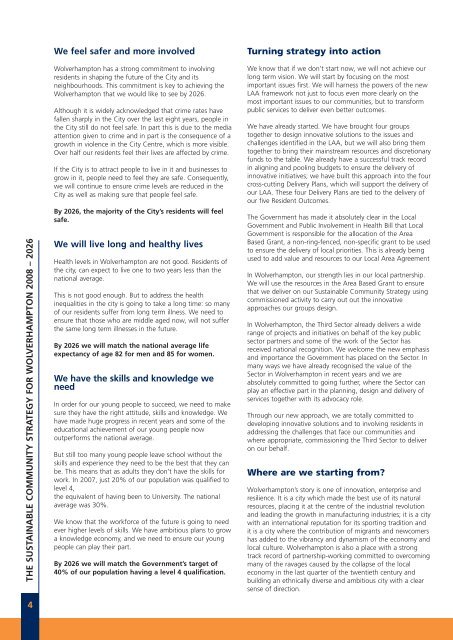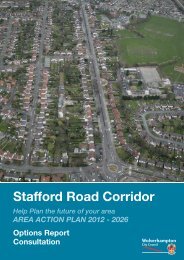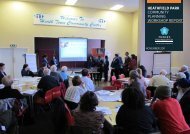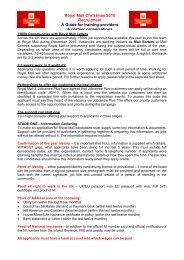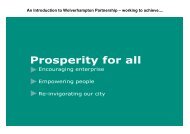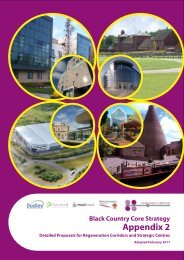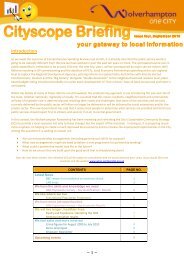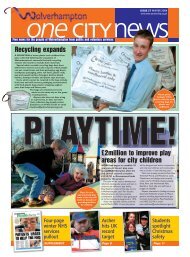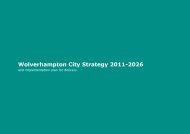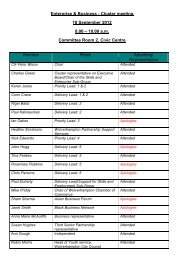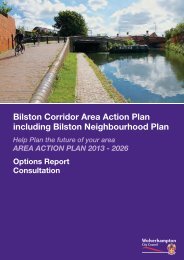Wolverhampton Sustainable Community Strategy
Wolverhampton Sustainable Community Strategy
Wolverhampton Sustainable Community Strategy
You also want an ePaper? Increase the reach of your titles
YUMPU automatically turns print PDFs into web optimized ePapers that Google loves.
THE SUSTAINABLE COMMUNITY STRATEGY FOR WOLVERHAMPTON 2008 – 2026<br />
4<br />
We feel safer and more involved<br />
<strong>Wolverhampton</strong> has a strong commitment to involving<br />
residents in shaping the future of the City and its<br />
neighbourhoods. This commitment is key to achieving the<br />
<strong>Wolverhampton</strong> that we would like to see by 2026.<br />
Although it is widely acknowledged that crime rates have<br />
fallen sharply in the City over the last eight years, people in<br />
the City still do not feel safe. In part this is due to the media<br />
attention given to crime and in part is the consequence of a<br />
growth in violence in the City Centre, which is more visible.<br />
Over half our residents feel their lives are affected by crime.<br />
If the City is to attract people to live in it and businesses to<br />
grow in it, people need to feel they are safe. Consequently,<br />
we will continue to ensure crime levels are reduced in the<br />
City as well as making sure that people feel safe.<br />
By 2026, the majority of the City’s residents will feel<br />
safe.<br />
We will live long and healthy lives<br />
Health levels in <strong>Wolverhampton</strong> are not good. Residents of<br />
the city, can expect to live one to two years less than the<br />
national average.<br />
This is not good enough. But to address the health<br />
inequalities in the city is going to take a long time: so many<br />
of our residents suffer from long term illness. We need to<br />
ensure that those who are middle aged now, will not suffer<br />
the same long term illnesses in the future.<br />
By 2026 we will match the national average life<br />
expectancy of age 82 for men and 85 for women.<br />
We have the skills and knowledge we<br />
need<br />
In order for our young people to succeed, we need to make<br />
sure they have the right attitude, skills and knowledge. We<br />
have made huge progress in recent years and some of the<br />
educational achievement of our young people now<br />
outperforms the national average.<br />
But still too many young people leave school without the<br />
skills and experience they need to be the best that they can<br />
be. This means that as adults they don’t have the skills for<br />
work. In 2007, just 20% of our population was qualified to<br />
level 4,<br />
the equivalent of having been to University. The national<br />
average was 30%.<br />
We know that the workforce of the future is going to need<br />
ever higher levels of skills. We have ambitious plans to grow<br />
a knowledge economy, and we need to ensure our young<br />
people can play their part.<br />
By 2026 we will match the Government’s target of<br />
40% of our population having a level 4 qualification.<br />
Turning strategy into action<br />
We know that if we don’t start now, we will not achieve our<br />
long term vision. We will start by focusing on the most<br />
important issues first. We will harness the powers of the new<br />
LAA framework not just to focus even more clearly on the<br />
most important issues to our communities, but to transform<br />
public services to deliver even better outcomes.<br />
We have already started. We have brought four groups<br />
together to design innovative solutions to the issues and<br />
challenges identified in the LAA, but we will also bring them<br />
together to bring their mainstream resources and discretionary<br />
funds to the table. We already have a successful track record<br />
in aligning and pooling budgets to ensure the delivery of<br />
innovative initiatives; we have built this approach into the four<br />
cross-cutting Delivery Plans, which will support the delivery of<br />
our LAA. These four Delivery Plans are tied to the delivery of<br />
our five Resident Outcomes.<br />
The Government has made it absolutely clear in the Local<br />
Government and Public Involvement in Health Bill that Local<br />
Government is responsible for the allocation of the Area<br />
Based Grant, a non-ring-fenced, non-specific grant to be used<br />
to ensure the delivery of local priorities. This is already being<br />
used to add value and resources to our Local Area Agreement<br />
In <strong>Wolverhampton</strong>, our strength lies in our local partnership.<br />
We will use the resources in the Area Based Grant to ensure<br />
that we deliver on our <strong>Sustainable</strong> <strong>Community</strong> <strong>Strategy</strong> using<br />
commissioned activity to carry out out the innovative<br />
approaches our groups design.<br />
In <strong>Wolverhampton</strong>, the Third Sector already delivers a wide<br />
range of projects and initiatives on behalf of the key public<br />
sector partners and some of the work of the Sector has<br />
received national recognition. We welcome the new emphasis<br />
and importance the Government has placed on the Sector. In<br />
many ways we have already recognised the value of the<br />
Sector in <strong>Wolverhampton</strong> in recent years and we are<br />
absolutely committed to going further, where the Sector can<br />
play an effective part in the planning, design and delivery of<br />
services together with its advocacy role.<br />
Through our new approach, we are totally committed to<br />
developing innovative solutions and to involving residents in<br />
addressing the challenges that face our communities and<br />
where appropriate, commissioning the Third Sector to deliver<br />
on our behalf.<br />
Where are we starting from?<br />
<strong>Wolverhampton</strong>’s story is one of innovation, enterprise and<br />
resilience. It is a city which made the best use of its natural<br />
resources, placing it at the centre of the industrial revolution<br />
and leading the growth in manufacturing industries; it is a city<br />
with an international reputation for its sporting tradition and<br />
it is a city where the contribution of migrants and newcomers<br />
has added to the vibrancy and dynamism of the economy and<br />
local culture. <strong>Wolverhampton</strong> is also a place with a strong<br />
track record of partnership-working committed to overcoming<br />
many of the ravages caused by the collapse of the local<br />
economy in the last quarter of the twentieth century and<br />
building an ethnically diverse and ambitious city with a clear<br />
sense of direction.


